Your Trip To Africa
USA to Dar es Salaam, Tanzania. Getting to Dar es Salaam from the USA: Several major airlines fly into the capital of Tanzania — Dar es Salaam. These include, KLM, Swiss Air, Ethiopian Airlines, and others.
Dar to Kigoma: Getting to Kigoma from Dar es Salaam: From Dar to Kigoma you will need to have a domestic flight to bring you to Kigoma. This second set of tickets is currently available on Air Tanzania. Their website is: https://www.airtanzania.co.tz
Roundtrip is currently under $300.
Nitty Gritty Of Making The Trip
Money to Bring: While visiting, you will need to be responsible for your own finances. There are limited ways that the missionaries can help you. Bring enough funds to cover all but the most unexpected emergencies. Listed below are a variety of options to manage your money while visiting Tanzania.
Credit cards: Except for some hotels in Dar, do not rely on using credit cards. They are still a very new thing in Tanzania. Credit cards are can be used in the major hotels in Dar es Salaam for rooms or meals but not in the majority of the interior of the country.
ATM machines are now installed in the capital and there is even one in Kigoma but none of our guests have tried it.
Traveler’s Checks: In order to cash a Traveler’s Check in Tanzania, you must have your “Advice of Purchase” slip that was given to you when you purchase the Traveler’s Checks. You will not usually get as good of exchange rate for Traveler’s checks as you get for $100 bills in cash. Traveler’s Checks are really a bit of a hassle, and you will more than likely spend the better part of a day trying to get them cashed.
Cash: Cash is the most ideal form of handling your money while in Tanzania. It should be in the form of new, crisp $100 (or possibly $50 bills). You will get the very best exchange rate for clean new $100.00 bills. Soiled or torn bills are not accepted. There are Currency Exchanges in the Dar es Salaam airport and our staff can get $100 bills changed for you in Kigoma.
The recommendation of our recent visitor is, “Bring more cash than you think you will need. Cash is easier to exchange than traveler’s checks.”
Wiring Money: In a real emergency, funds could be wired into the missionary’s bank account in Tanzania but it usually takes from 5 to 7 days for it to arrive. If you find you have to use this, please contact Melinda Bendle at the Joy in the Harvest USA office phone number: 708-925-6681 and email: usaoffice@joyintheharvest.com to get our Tanzania account numbers. She may also be able to help expedite the wiring of emergency funds.
Funds Advanced from JOY: In an emergency, it may be possible to get a funds advance from Joy in the Harvest. This would require that arrangements be made with friends or relatives back in the states to send a check to our USA office to cover the funds advanced.
Health Considerations
Health: Here is a bullet point list of health problem prevention steps that need to be taken. On the mission field, these are top health precautions.
Malaria: Malaria is a big problem in Africa. This disease is no joke and should be taken seriously. Unless you have health considerations, which prevent you from taking prophylactic malaria drugs, you should get on an anti-malaria drug. (But remember to consult your doctor to insure you get on the right prophylactic medication for you.) Once you have the prescription, be sure to take it for the appropriate time before leaving, and stay on the drug for the proper time after you arrive home. Certain precautions can be taken while in the country to aid in the prevention of the disease: avoid getting bitten by mosquitoes, use insect repellent, stay inside at dusk, and sleep under netting whenever possible. Be especially careful in the cities where people from all over bring a variety of strains of the disease into one location.
Read about malaria and its prevention and treatment on the Centers for Disease Control website.
Shots: There are no legally required shots or medications to enter Tanzania from the U.S.A. We recommend consulting with your doctor about any shots you will need before the trip. Joy in the Harvest does not make recommendations concerning routine vaccinations. For more information, the CDC has very specific recommendations for each country in East Africa. Due to the constantly changing situation, we recommend the latest information directly from the CDC website.
International Certificate of Vaccinations: This is a little yellow book about the size of your passport. It is called a CDC 731. All your immunizations should be recorded in this booklet and then the booklet should be stapled into the back of your passport. There is also space for recording your blood type and eyeglass prescription. Record all important data such as anything to which you are allergic. Many countries are not requiring proof of vaccinations unless a person is arriving from an infected yellow fever area. This yellow booklet, when properly filled out, is acceptable proof of vaccinations in almost every country. Because regulations of required immunizations are in a state of flux and not all officials know or enforce the most current regulations, we are still recommending our visitors to get this yellow booklet and use it.
You can get the CDC 731 from most doctors who give vaccinations for international travel and they are available by using the link provided on the following website: https://bookstore.gpo.gov. They are a dollar a copy but, unfortunately, you have to buy 25 copies in bulk from the government bookstore. Once you get it filled out, before you travel, we recommend that you staple it in the back of your passport. It is far less likely to get lost, stolen or “misplaced” by some official.
Yellow Fever: The yellow fever shot requirements seem always to be changing. It is not required for entry into Tanzania unless you are arriving from a country where Yellow Fever is a problem. This vaccination was once considered good for 10 years but is now considered valid for life. Yellow Fever vaccine is only given at approved vaccination centers.
South Africa can require the shot to gain entry. This has not happened to us but it could happen. South Africa has the highest quality of medical care in Africa and would be the preferred destination in case of very serious medical emergency. So it is a good idea to get the Yellow Fever vaccination and have proof of it in the CDC 731.
Covid: Make sure you know the latest requirements, if any, concerning Covid. Tanzania had very strict requirements concerning vaccination and testing at one time. At the time of this writing, those requirements have been lifted. It is wise to know what testing, if any, is required. And if you need to be vaccinated for Covid.
Other Vaccinations: You will probably want to get certain other vaccinations and medications for vaccine-preventable diseases and other diseases. Before making any decisions it is important to discuss your travel itinerary with your doctor or nurse before you receive vaccinations. The CDC has recommendations for vaccinations for every country. To have the most benefit, see a health-care provider at least 4–6 weeks before your trip. In the case of certain vaccinations that require multiple shots spaced weeks apart, you should allow even more time. Even if you have less than 4 weeks before you leave, you should still see a health-care provider for needed vaccinations and anti-malaria drugs and other medications.
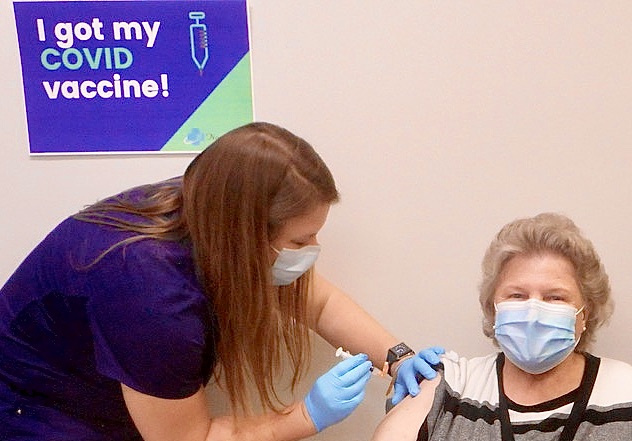
Additional Health Info: If your travel plans will take you to more than one country during a single trip, be sure to let your health-care provider know so that you can receive the appropriate vaccinations and information for all of your destinations. Concerning your normal prescription drugs, make sure you bring a good supply and always carry them in your hand luggage. To be extra safe, bring 2 full prescriptions – twice what you know you will need — in their original containers and a copy of your written prescriptions. Make sure to keep your medicines with you. If your luggage gets lost you do not want your medications to be lost. You may want to carry half of them in another bag in case one gets lost or stolen. Many drugs available in the USA are not available in Tanzania, so replacing them if they get lost or stolen could be a problem. Make sure you bring more than enough of all medications and testing supplies you need.
Food: Food and drink are the major sources of stomach or intestinal illness while traveling. Intestinal problems due to poor sanitation are found in far greater numbers outside the U.S. and other industrialized nations. Don’t buy the cheapest meals! Don’t eat food from street vendors. In Dar es Salaam go to a good 3 to 5 star hotel to eat. Use high quality restaurants. In Kigoma our staff is trained on healthful meal preparation. After all, we have survived for over four decades on the food and water in Africa. So don’t worry too much! In Dar eat well at good restaurants and you will eat fine. While visiting Joy in the Harvest we will make sure you get plenty of good food to eat.
Water: In areas with poor sanitation only the following beverages may be safe to drink: Boiled or bottled water, hot beverages, such as coffee or tea, made with boiled water, and canned or bottled carbonated beverages. Ice may be made from unsafe water and should be avoided. It is safer to drink from a can or bottle of beverage than to drink from a container that was not known to be clean and dry. However, water on the surface of a beverage can or bottle may also be contaminated. Therefore, the area of a can or bottle that will touch the mouth should be wiped clean and dry. Where water is contaminated, travelers should not brush their teeth with tap water. In an emergency, use water out of the hot water tap (the hot water heater will have killed many of the “bugs”).
Bottled water is readily available everywhere in Tanzania. It is of good quality and is safe. Use it. In the Joy facilities drinking water is from a deep well and the water has been tested safe. For your comfort, it is always a good idea to travel with a bottle of drinking water on the airplanes. It is very important that you have plenty of drinking water at all times to prevent dehydration in the tropics.
Traveler’s Diarrhea: The typical symptoms of traveler’s diarrhea (TD) are diarrhea, nausea, bloating, urgency, and malaise. TD usually lasts from 3 to 7 days. It is rarely life threatening. Areas of high risk include the developing countries of Africa. The risk of infection varies by type of eating establishment the traveler visits – from low risk in private homes, to high risk for food from street vendors. Consider packing basic over-the-counter diarrhea medication just in case.
Health Environment at JOY: While you are with us you will find that we practice good health precautions and you will be at low risk. Common sense is always required.
Health Environment at Other Places: While traveling in Africa drink only bottled water at hotels, spray your rooms if there are mosquitoes or other insects. It is very important to take whatever precautions you can to avoid getting bitten by mosquitoes, as this is how malaria is spread. Be especially careful in the cities where people from all over bring a variety of strains of the disease into one location.
Some hotels are air conditioned and bug tight, while others will simply provide nets. It is a good idea to buy a can of insect spray upon arriving in Dar at the airport, but you cannot travel with it in an airplane to Kigoma. At least if you discover you have mosquitoes in your room at midnight, you are prepared.
If at any point you feel that these very basic health precautions are not being observed – complain or take action to improve the situation. By following these simple precautions, you will have avoided many problems before they start.
Additional Health Information: The medical treatment situation in Kigoma is problematic. At this time there are some missionary doctors in Kigoma but sometimes they travel and are away. There is a mission hospital that can provide some care about a 2 1⁄2 hour trip by Land Cruiser. The nearest adequate hospital approaching “USA style” medicine will be in Nairobi (a 4 hour flight in a light airplane or a 4 day drive). Excellent medical care will be available in South Africa (12 hour flying time in a light airplane, or 3 1⁄2 hour commercial flight from Dar es Salaam). If you are diabetic or have other health considerations we will do everything we can to accommodate your needs. Don’t hesitate to ask.
Do not plug a CPAP machine (or anything else) into our electrical outlets without checking with the missionaries first. Our electricity is very different from the USA and you may burn up your machine. Many with special health concerns have safely and happily made this trip with such health considerations. The most important thing is being prepared.
Packing
Packing: Clothing for Men and Women: Africa is a mix of many cultures and mores. At the same time, it is undergoing rapid changes. To show respect, especially for the Christian and Muslim communities, we suggest the following guidelines for attire.
Men: Men can wear either long pants, or jeans at any time. Wearing men’s shorts is sometimes viewed by the locals at comical, but not offensive. It is best not to wear shorts in public, as it is viewed as children’s attire. Men’s clothing is really not an issue.
Women: In public, ladies should wear dresses or skirts that fall below the knee. NO SHORTS IN PUBLIC. Showing your knees in public would be offensive to many. Although blue jeans or pants are not generally acceptable for women in Tanzania, it is a good idea to bring one pair of pants for going out on the boat, or sitting outside on your patio. Long skirts are very appropriate. When deciding what shirts to bring, keep in mind that they not be too tight or revealing. Shoulders are another part of the body that needs to be covered when going into public.
What to Bring & Leave Behind: Carry the minimum amount of valuables necessary for your trip and plan a place or places to conceal them. Your passport, cash and credit cards are most secure when locked in a hotel safe. When you have to carry them on your person, you may wish to conceal them in several places rather than putting them all in one wallet or pouch. Pick-pocketing is common. Avoid hand bags, fanny packs, and outside pockets which are easy targets for thieves. Inside pockets and a sturdy shoulder bag with the strap worn across your chest are somewhat safer. It is not unusual to have purses and shoulder bags snatched by passing motorcyclists.
One of the safest places to carry valuables is in a pouch or money belt worn under your clothing. If you wear glasses, consider packing an extra pair. Bring them and any medications you need (2 full prescriptions) in your carry on luggage. To avoid problems when passing through customs, keep medicines in their original, labeled containers. Bring a copy of your written prescriptions and the generic names for the drugs. If a medication is unusual or contains narcotics or are for a diabetic condition (needles and insulin), carry a letter from your doctor attesting to your need to take the drug.
Make two photocopies of your passport identification page, airline tickets, driver’s license, international license, and the credit cards that you plan to bring with you. Leave one photocopy of this data with family or friends at home; pack the other in a place separate from where you carry your valuables but is also secure. Leave a copy of the serial numbers of your traveler’s checks (if you use them), with a friend or relative at home. Carry your copy with you in a separate place from your checks and, as you cash the checks, cross them off the list. Bring the receipt (advice of payment) for your Traveler’s checks with you. You will need the “advice of payment” to cash Traveler’s checks in Tanzania. This is the little paper which they give you when you buy them..
Leave at home: Don’t bring anything you would hate to lose, like valuable or expensive-looking jewelry. Same is true for irreplaceable family objects. Leave home all unnecessary credit cards or other valuable documents you won’t need. Leave with friends the info and numbers of the credit card(s) you do bring so they can be cancelled if lost or stolen.
Leave a copy of your itinerary and our contact information with family or friends at home in case they need to contact you in an emergency.
Have your will updated, along with some specific recommendations and wishes if something should happen, heaven forbid, on this trip. Leave it with family or friends. Be realistic about the repatriation of remains.
Inventories: It is advised to make an inventory of each checked luggage piece. Use a separate piece of paper for each inventory. Carry two copies of the inventories. If customs wants to check a piece of luggage, you can produce the inventory for that specific piece and present it. We have found that it often makes clearing customs much easier. It is also suggested that you take a cell phone picture of each checked piece of luggage. If the airlines delays or loses your luggage, it makes it easier to identify them.
Labels: We like to label each piece of checked luggage. It doesn’t hurt to put three labels on each piece. Here is a sample label that we produce.
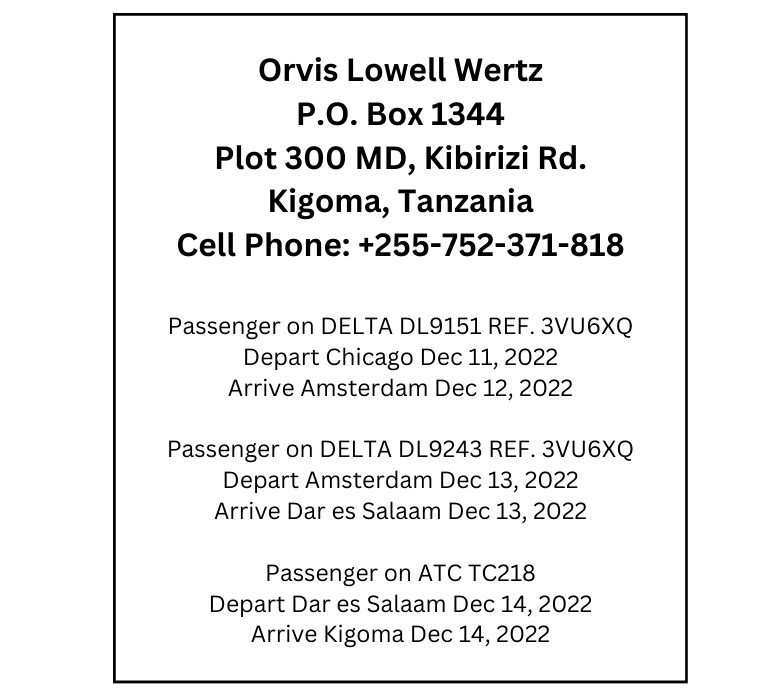
Your Luggage: Most airlines from the USA to Dar es Salaam will permit each passenger to check two 50 pound pieces of luggage for free. Sometimes three pieces will be allowed on the special humanitarian tickets. You must check them all the way through to Dar or you will be hit by extremely high charges at your layover in Europe.
Your coming to the mission is a great opportunity for us to get spare parts, supplies, and other essentials. We ask each visitor to donate one piece of their luggage allowance to courier supplies to the mission. This is an important way to help. We will reimburse any customs charges or other expenses involved in you bringing us supplies.
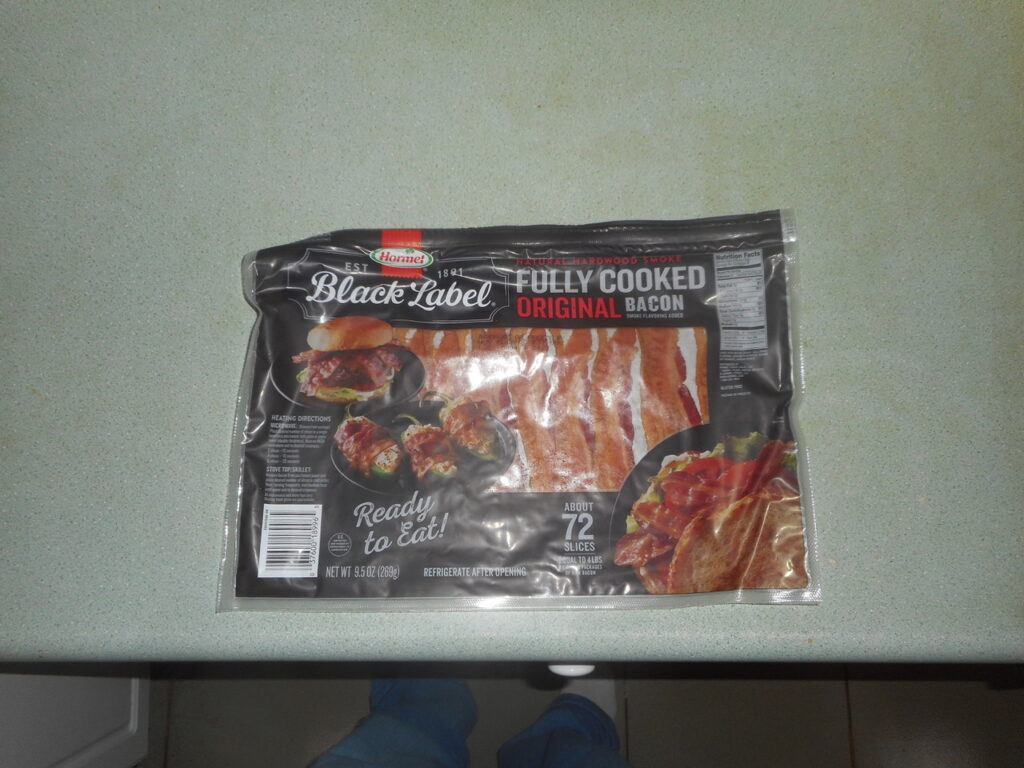

Most people over pack. A washer and dryer are available and 50 pounds of personal effects and clothing is a lot for most people. Packing appropriately is an art. Don’t over-pack.
We have found lightweight plastic trunks, available online from Walmart, work really well. They give maximum space, while meeting airline size limits. Here is a picture of the trunks I am referencing.
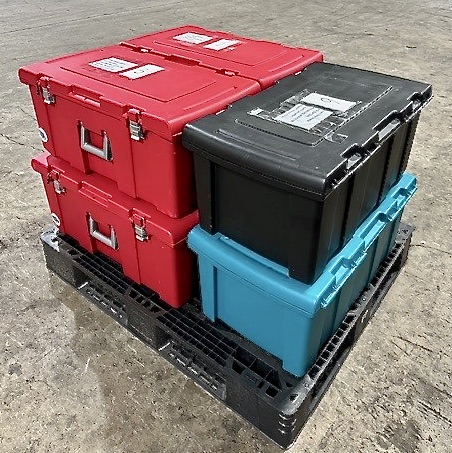
In addition to the one place provided to secure the trunk lid with a tie-wrap, we drill holes on each side of each latch and tie-wrap the latches in place so they can’t open and get broken off.
Travel Insurance: Some of our guests purchase travel insurance that provides for medical evacuation by private airplane, usually to Nairobi. You can check this out online. Flying Doctors provides evacuation coverage at reasonable cost. If you need to buy health insurance coverage, you can check that out too. There are low costs, good benefits policies offered by a number of agencies working with short term mission trips. You can check out this website for information: https://www.missionaryinsurance.com.
Your Arrival In Tanzania
Dar Airport: The airport has a new terminal and it is very modern. If you need to buy your tourist visa, you will need to go to the Visa Desk to do so. The cost is $100. Once you go through immigration and get your passport stamped in, you will go to the luggage belts and get your checked luggage. Porters can be hired to help you, if you like.
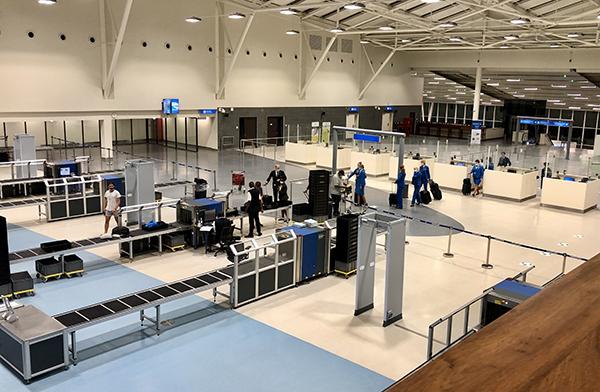
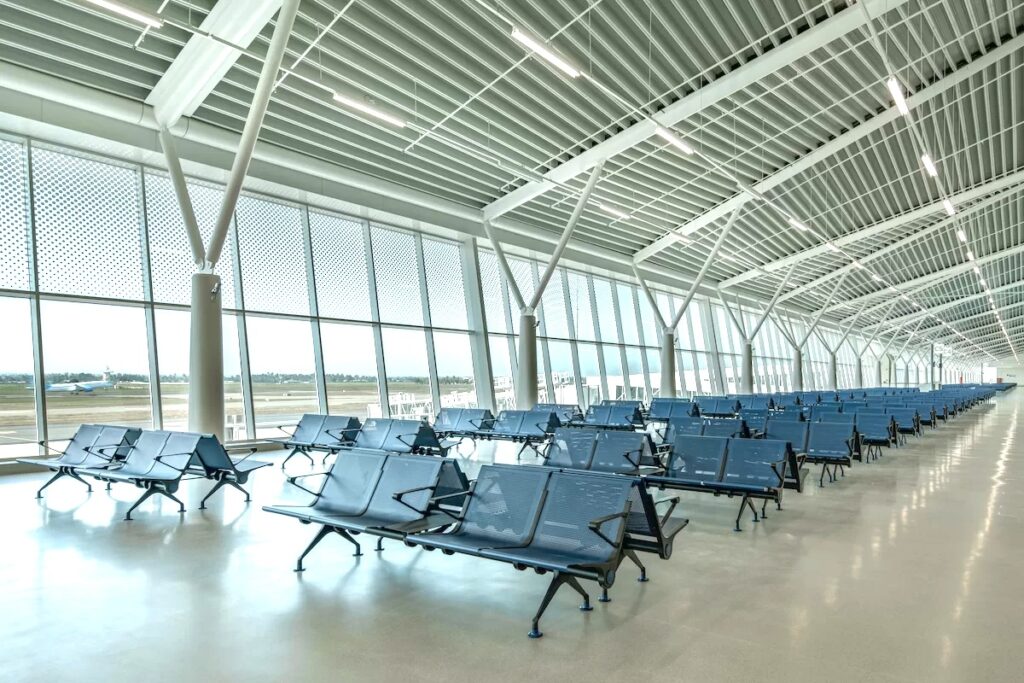
If you need Tanzania Shillings (the Tanzania form of currency), there is a 24 hour currency exchange before you get to customs. The current rate, as I write this, is $1 = T.Sh. 2,500.
Then you will head to the customs area. All incoming luggage is X-Rayed. The operator of the X-Ray machine will alert a customs agent if he feels a piece of luggage needs to be inspected. Although customs is usually pretty easy, sometimes you might be asked to open a piece of luggage. This is when you present the inventory for only that piece of luggage. Once they read it they may release you to go or may proceed with the inspection. If a customs payment is due, there is a room off to the side where an agent will work out the paperwork and bill. Once paid, you are free to go. Leaving the custom area you go outside and you are out of the terminal. Your taxi driver will meet you there.
Dar Taxi: For many years we have been using Mr. John Francis, a taxi driver, in Dar es Salaam.
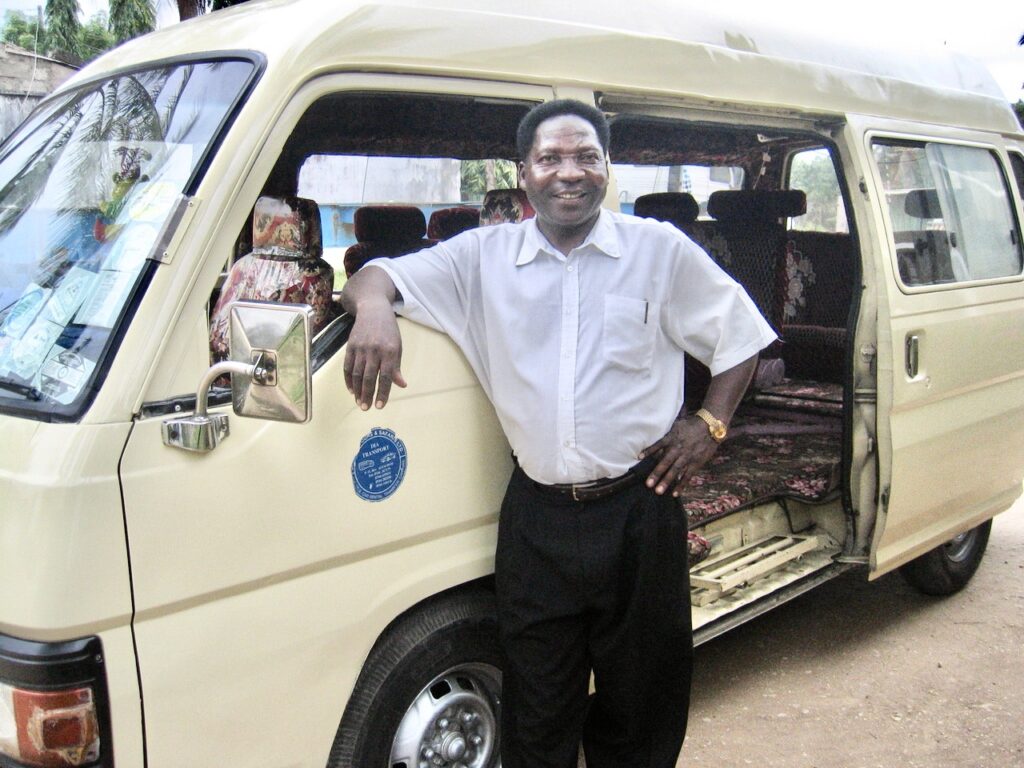
John has shown himself to be reliable and honest. He drives a nine passenger, air-conditioned van. John knows the city and surrounding area well. He has a working knowledge of English — but it is far from perfect. He often will be wearing a yellow baseball cap that says, “Joy in the Harvest” on it so you can recognize him.
John will do everything for you in Dar. He will take you to your hotel, bring you back to the airport for your Air Tanzania flight, and take you to restaurants or shopping if you like and have time. He can arrange for porters to help you at the airport through security and check-in for Kigoma.
John’s charges are appropriate for hiring a van. He provides a level of safety for our guests and will look out for your well-being.
Dar Hotel: You should have your hotel reservation made in advance. We now favor just staying at a hotel. There are many nice hotels in Dar. We often recommend staying at the Holiday Inn City Center. You can select your hotel online and make your reservations well in advance. John will get you to whatever hotel you reserve.
Air Tanzania (ATC): The flight time from Dar to Kigoma is about two hours. The airplanes carry about 70 passengers. The flight is non-stop.
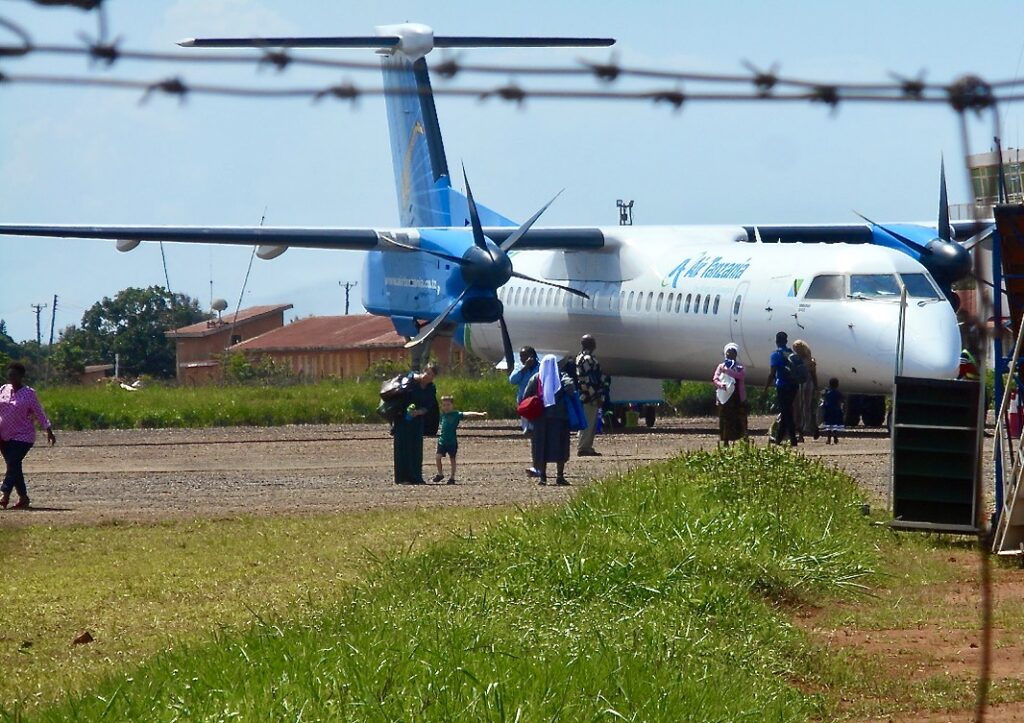
Arrival in Kigoma: Upon landing you will disembark and head to the building under a long covered sidewalk. Outside the building is a desk where you must present your passport to have it recorded in the immigration book. Once inside the building you will wait for the arrival of the luggage. There is no luggage belt — just a platform they will put your luggage on. Usually inside this room you will be met by someone from Joy in the Harvest. Often it is Mr. Mwenge. You will be helped with your luggage to our Land Cruiser. You will be either taken to the Wertz residence or your guest house. Now you can relax! The trip is over and you have arrived to your new African home! Let the fun begin!!
